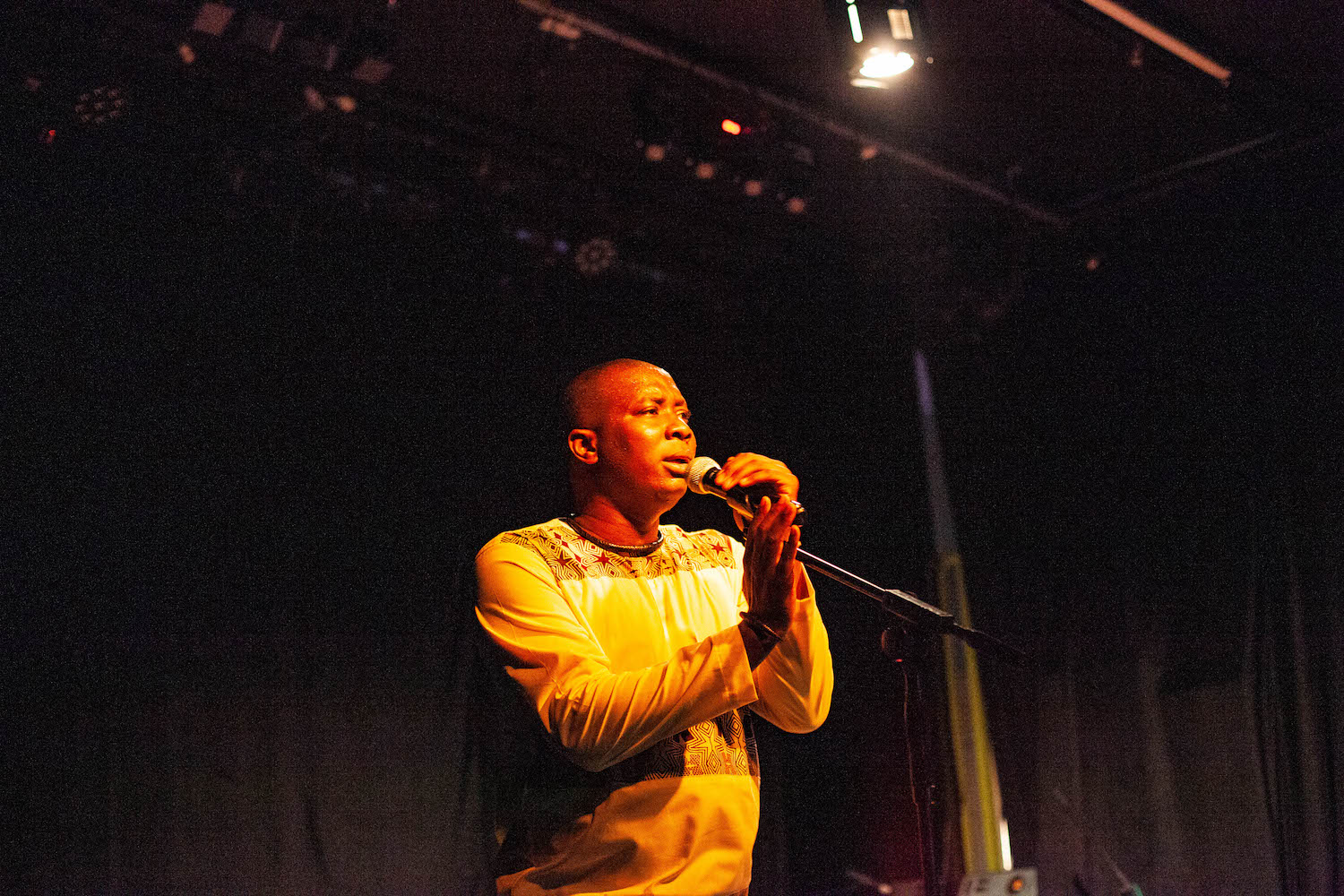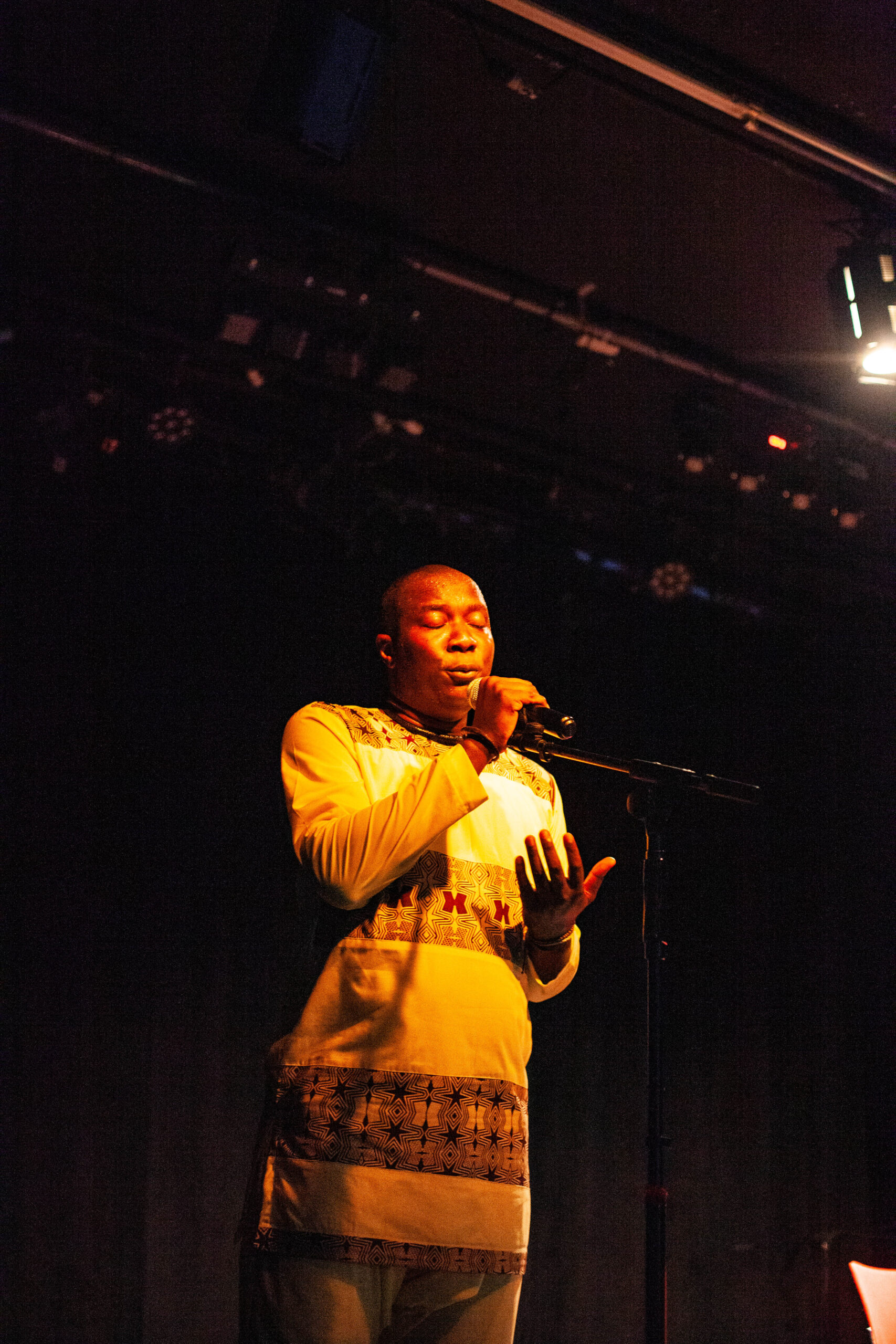
With several distinctions to his credit, including the prestigious Prix SILA Bernard B. Dadié for young writers in 2022, slam poet Nin’wlou will be on stage at the Goethe Institute on Friday April 19, having taken us into the abyss of his creative genius. Read the story.
By Siamlo Victoria SEDJI
A piercing cry, set to soft Mandingo music, solemnly marries the artist’s entrance on stage. A play of light dissipates then eclipses the half-light, heralding the advent of a poetic tableau. One step at a time, Nin’wlou, a young master of the spoken word, is ready for « La marche du feu », the title of his award-winning eponymous collection. Decked out in his favorite stage garb, a full sarouel, he strolls across the stage and burrows into the backdrop, which has changed pace as the long-awaited adventure gets underway.
This year, the young artist has a stage all his own at MASA, and he’s proud of it. « This edition is special because it’s my first in the official selection; it’s my first show (…). It’s the start of something, so of course we feel honored and proud to have got this whole hall up on its feet, » he says backstage after the show.
Nin’wlou, a sure-fire pawn of poetry-slam
Nin’wlou is now on stage, scrutinizing the audience. His gaze plummets and pierces the audience, before he begins his litany. The poet-slammer recounts, calmly then vigorously, sometimes melancholy, sometimes with a more cheerful emotion, part of his history in this art he has helped to make famous over the last nine years. Every word, every verse counts. The artist has the temperament of a purist. He searches far and wide for the best poetic expressions, sharpening and highlighting them, isolating the letters of the alphabet in a stylistic game all his own. A majestic silence pervades the room, an attentive and assiduous witness to the epic that the artist relates in a vocabulary rich in literary figures. He has no secrets when it comes to words. Like a wine ready to be tasted, Nin’wlou made his own libation, savoring the words of French and those of Guéré (his mother tongue), before offering them to his audience. « If they ask you who I am, tell them I’m Nin’wlou and that I speak fire; if they ask you where I come from, tell them I come from Farafina la belle with the scent of crushed shea (…)« . He continues in the same solemn tone: « Sitting in the shadow of his past glories, my grandfather looked further than the tip of his nose. At his feet, a rusty arrow; palms and flowers withered by the ages, he told me: the whispers that caress the bark of the palaver tree, end up treading the threshold of the remotest hut in the village (….). Retreat is part of the choreography of the mask; the strong know how to fight, but the wise know how to win (…) ». « Zian mon zian » (today is today, in Guéré)
Captivating, lively, instructive. Nin’wlou’s art is like a sweet panacea. But Nin’wlou’s words reflect both silence and the cry of the soul. For it bears the scars of a shared human history. That of our destiny. The one lived with ourselves or with our own. That of the past, but also of the future. There are artists who act as heralds for their contemporaries. Nin’wlou is no exception to the rule. But his complicity with art, his filiation with the Africa of his fathers and mothers, can take us all the way back to the huts of cosmogony. If « the world is old, the future comes out of the past« , says Guinean writer Djibril Tamsir Niane. Nin’wlou, for his part, wants to continue bearing his roots, just as a tree never abandons its vines. And like an African woman wears her hair.
In front of an eager audience, Nin’wlou performs one song after the other, not hesitating to add a touch of humor, letting himself be bewitched by the delirium that grips his audience. Clearly, some of them have mastered several lines of his lyrics, and go right to the heart of it. In the aftermath, the voices rise up, embracing that of the artist in symbiosis. Under the spell of the verses and the multiple figures of speech that enrich and underpin her creative genius, we sing and laugh, and get carried away by a thousand and one words! In each of her songs, Nin’wlou talks about almost everything. A toast to life’s vicissitudes. Pays vibrant tribute to her mother. Mourns his dearly departed father, as well as his late colleague « Philo », who passed away in the prime of life this year. In the middle of his recital, he opens a leaf and declaims « les morts ne sont pas morts » (« The dead are not dead ») by the Senegalese writer Birago Diop, as if to console himself. He also evokes tender and painful memories, celebrates the love of a woman so loved and desired, motivates his audience, and denounces the tares of Ivorian society.
« As I say, it’s a dictation from God. We open our hearts, we’re sensitive to the slightest movement of the heart and mind. When we see things that outrage or excite us, we don’t hold back. I try to add Nin’wlou to everything. Nin’wlou means trying to say things differently. Nin’wlou in Wè means a word of fire (…)« .

Lulled by the power of these powerful words and the kora salvo that accompanies them at times, the audience revels. They savor each verse without tiring, and let themselves be enveloped by the gentle music of the epilogue – composed by a seasoned pianist and guitarist – which brilliantly embraces the artist’s lyrical flights. Between two texts, his orchestra harmonizes the sounds, refining the notes until another melody takes shape. In the auditorium, some of the biggest names in the cultural world didn’t want to be told about this umpteenth episode of the « fire march ». Seated in the front row, well-known cultural figures such as Henri N’koumo, comedian Marshal Zongo and his master Alain Tailly seemed visibly captivated. The audience was full of praise, generous and wildly enthusiastic.
Slam poetry to express frustration
The show lasts almost an hour and a half, without ever tiring the audience. It ended with a communion of voices around the cult song « Restaucratie », a denunciation of the seizure of power in our society by hungry, thirsty and greedy elites guilty of embezzlement of public funds, receiving stolen goods and favoritism, providing a breeding ground for demagoguery and mismanagement. So busy thinking only of themselves that they end up relegating the suffering of the people to the back-bench of their priorities. « …they eat when we cry, they eat when we die … they eat, they only eat! At the buffet of the voracious, they get drunk on bribes, tossed by taxes, over there, they eat iron! Abracadabra, it’s raining bills (…) they talk about our miseries with their hand in their plate (…) too much chaos on the road, cocoa! Our parents are quitting, teenagers are looking for solutions! » The audience recites in chorus the refrain « we add cutlery and it only eats! » as if their lives depended on it, in an end to the evening that is as funny, spectacular and consciousness-raising as ever. To thunderous applause and Ivorian-style laughter.
« It’s the first time, I didn’t know him before. Ah, it’s magnificent, it’s magic! I’m completely in awe of his mastery of words, » says director Maurice Eliakim, who has just enriched his culture and his mind thanks to the Marché des Arts du Spectacle Africain d’Abidjan.
MASA raises the profile of slam and poetry-slam made in Côte d’Ivoire
For several years now, MASA has played an eminently crucial role in the development of slam and poetry-slam in Côte d’Ivoire’s colors, both nationally and internationally. On the one hand, by offering a broad platform for expression, it has contributed to the popularization of several talents, to their true blossoming and professionalization, by enabling them to expand their fields. In addition, MASA has made it possible for the artists who make a living from it to expand their audiences, and to explore a number of other opportunities. MASA 2024 is also a showcase for slam and poetry-slam. No fewer than a dozen slots are dedicated to this genre, for no fewer than a dozen artists from a wide variety of backgrounds, some of whom have taken part in staged readings for young audiences.
